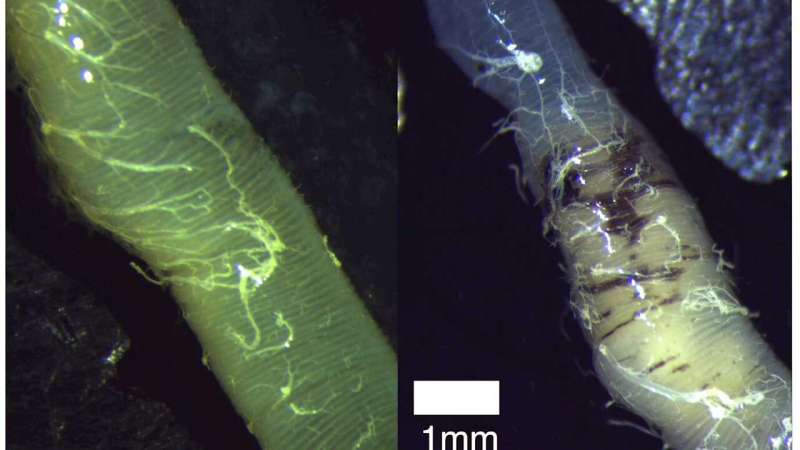Co-formulants used in commercial fungicide affects the health of bumblebees

Researchers from Royal Holloway, University of London have found for the first time that a co-formulant found in commercial agricultural pesticides used across the UK significantly affects the health of bumblebees.
The new study shows that exposure to alcohol ethoxylates—a type of co-formulant used in fungicides—can cause severe gut damage, leading to a lack of appetite, weight loss and mortality in bumblebees.
Bumblebees are regularly exposed to fungicides and pesticides, and these agricultural chemicals are thought to be a driver of the decline in bees across the globe. Regulation of pesticides has always focussed on the main ingredients in the pesticide product and their impact on bee health, with co-formulants—such as alcohol ethoxylates—being overlooked as a potential threat. This represents a large gap in pesticide regulation, as this study demonstrates co-formulants can drive the entire toxicity of a product.
Ed Straw, Ph.D. researcher in the Department of Biological Sciences at Royal Holloway, and author on the paper, said: "The results of our research demonstrates gaps in the pesticide regulatory systems in the UK and EU that are putting vital bee populations at risk.
"Whilst 30 percent of bees exposed to the fungicide product died, the other 70 percent were far from healthy; they had damaged guts, were eating about half as much food and were losing weight. Pesticide regulation typically only looks at whether or not a bee dies, but we found that even bees who survive can be under severe stress."
The researchers tested a small oral dose of the fungicide product, and equivalent doses of each individual co-formulant in the fungicide, which enabled them to measure the toxicity of the chemicals. By doing this, they were also able to identify the ingredient in the fungicide that was responsible.
Beyond finding that the co-formulant was dangerous to bees they also identified problems with how pesticides are regulated in the UK and EU.
The work was funded by PoshBee, an EU-wide collaboration of scientists working to understand the impacts of pesticides on bee health.
Professor Mark Brown from the Department of Biological Sciences at Royal Holloway, added: "While the results of lab experiments like this are often questioned, other research done under field-realistic conditions within the PoshBee project show similar results. This combination of results, enabled by this European-wide project, really supports the idea that co-formulants in pesticides need to be considered more seriously as threats to bee health."
More information: Robin Mesnage et al, Improving pesticide-use data for the EU, Nature Ecology & Evolution (2021). DOI: 10.1038/s41559-021-01574-1
Edward A. Straw et al, Roundup causes high levels of mortality following contact exposure in bumble bees, Journal of Applied Ecology (2021). DOI: 10.1111/1365-2664.13867
Journal information: Journal of Applied Ecology , Nature Ecology & Evolution
Provided by Royal Holloway, University of London


















